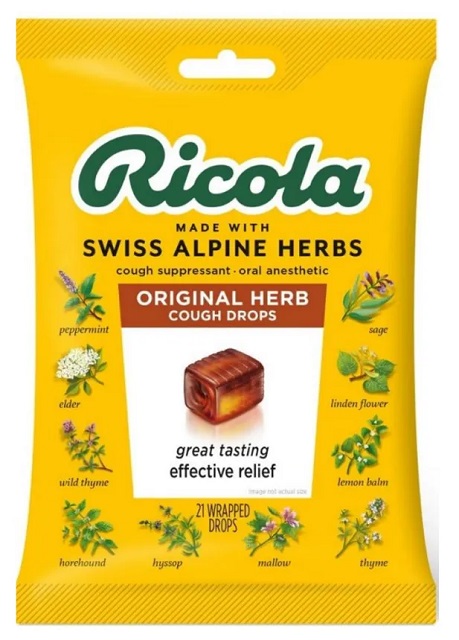Earlier this month, consumers brought a putative class action against Ricola USA, Inc., the makers of the popular cough drop brand. The suit, brought in the Central District of Illinois, surrounds Ricola's labeling of its "Original Herb" cough drops.
The packaging includes representations such as "made with Swiss alpine herbs," "original herb cough drops," "great tasting, effective relief," as well as imagery of a variety of different herbs (peppermint, elder, wild thyme, horehound, hyssop, mallow, sage, linden flowers, lemon balm and thyme) and a picture of an amber lozenge.
Plaintiffs allege that the product "conveys the message that its herbal ingredients are responsible for the cough suppressant and oral anesthetic properties it provides" when in fact, the product's active ingredient is menthol (which is listed as such on the ingredients label located on the back of the packaging, whereas the herbs are listed as inactive ingredients). Interestingly, plaintiffs cite examples of competitive herbal cough drop products on the market that disclose the drops have or are made with menthol on the front of the packaging.
As we've previously blogged about, the Southern District of New York, relying on Second Circuit precedent, recently held that consumers could reasonably interpret "made with" claims to communicate that the product consists entirely or at least predominantly of the applicable ingredient(s) (in that case, whole grains) and that "a reasonable consumer should not be expected to consult the Nutrition Facts panel on the side of the box to correct misleading information set forth in large bold type on the front of the box."
So, does a "made with" claim also reasonably communicate that the applicable ingredient is also the product's active ingredient? This case is stilI in its early stages, stay tuned!
Davis et al. v. Ricola USA, Inc. 22-cv-3071, C.D. Ill. (May 2022)

This alert provides general coverage of its subject area. We provide it with the understanding that Frankfurt Kurnit Klein & Selz is not engaged herein in rendering legal advice, and shall not be liable for any damages resulting from any error, inaccuracy, or omission. Our attorneys practice law only in jurisdictions in which they are properly authorized to do so. We do not seek to represent clients in other jurisdictions.

